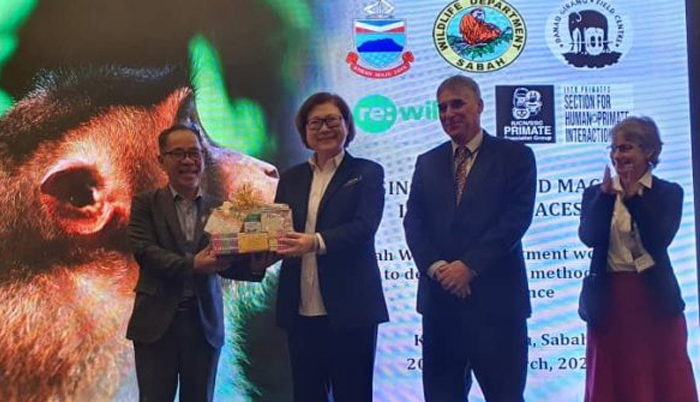![]() Home > Sabah
Home > Sabah
Many Villages, Towns In Sabah Facing Macaque Problems

Tuuga (second from left) presenting a memento to Christina, witnessed by Benoit (second from right) and Dr Felicity Oram (right) from IUCN Primate Specialist Group on Human-Primatem.
![]() March 21st, 2023 | 06:58 AM |
March 21st, 2023 | 06:58 AM | ![]() 281 views
281 views
KOTA KINABALU
Many villages and towns in Sabah are plagued with macaque problems.
Major areas of conflict are in Beaufort, Kuala Penyu, Kota Kinabalu, Kota Belud, Tawau, Lahad Datu and Sandakan.
“They go inside buildings and steal some things. We have received a lot of calls from many kampungs and towns, but we don’t have enough manpower to go around, we don’t have enough traps because there are so many kampungs, hundreds of kampungs calling you to get rid of disturbance. Many people want this problem solved once and for all but cannot.
“You put traps, you get 20 or 30, but the next day, no more. They (the macaques) learn not to enter. So, the problem persists,” said Sabah Wildlife Department (SWD) director Augustine Tuuga.
“There are hundreds of them, maybe thousands and more…the best way is to manage, to co-exist with them, which is why we have this workshop,” he said to members of the media after the launch of the ‘Managing People and Macaques in Shared Spaces’ – A Sabah Wildlife Department workshop to develop better methods of co-existence’ at the Le Meriden Hotel on Monday.
In his speech, Tuuga said that SWD feels that it is timely to readdress the management of the two macaque species that live in the state, namely the long-tailed macaque or kera in Bahasa Malaysia, and the pig-tailed macaque, known locally as beruk, as these species have been upgraded in threat status to Endangered by the IUCM in March 2022.
“People and wildlife are increasingly more likely to live closer to each other due to the loss of natural forest habitat and increasing fragmented forests due to human activities, creating challenges for both. In the case of macaques, a type of monkey that is especially good at taking advantage of new circumstances, interactions and incidents with people are increasingly common,” he said.
He also said that in Sabah, the second most frequent human-wildlife conflict is caused by the macaques, which comprises nearly 30 percent of all the conflicts that were handled by the departments for the period 2012 to 2022.
“Major areas of conflict are in Beaufort, Kuala Penyu, Kota Kinabalu, Kota Belud, Tawau, Lahad Datu and Sandakan. These primates are translocated after being caught and brought to other areas where they are released to thrive in the wild. In the more recent years between 2018 and 2022, the Sabah Wildlife Department has translocated a total of 3,454 macaques,” he said.
Tuuga described human-wildlife conflict as interaction between wild animals and people that results in negative impact on both parties affecting people, resources, animals and habitat.
“It involves different forms of effects – from crop damage and predation and attacks on livestock that causes monetary loss, to wildlife attacks on humans that result in injuries and in extreme cases, even loss of life.
“The proximity of macaques and humans also raises a public health concern through the transmission of zoonotic diseases,” he said.
Danau Girang Field Centre (DGFC) director Professor Benoit Goossens, who was also present at the media conference, explained that one of the biggest problems linked to macaques is malaria.
“In the northern part of Sabah, we found out that macaques carry plasmodium. The mosquito can bite the macaque and bite a person in a village and transmit malaria. If macaques are closer to people, there is a possibility of an increase in malarial cases in Sabah,” he said.
Meanwhile, Tourism, Culture and Environment Minister Datuk Christina Liew, who launched the event, said that macaques are protected species under the Wildlife Conservation Enactment 1997.
“It is also now classified as Endangered, facing threats mainly from the loss of habitat … apart from the main factors contributing to human-macaque conflicts which are habitat loss and degraded habitat, another factor – urbanisation – is becoming a lead cause of these conflicts,” she said.
She added that urbanization has resulted in the mass availability of discarded food from domestic and commercial wastes, and interactions between humans and wildlife through feeding.
“In general, the macaques are attracted to residential neighborhoods, whether in the city or villages to forage for edible scraps and wastes. Improper garbage disposal and feeding of animals by well-meaning people, further encouraged macaques to frequent these spots.
“It is due to all these factors that there is a need for a joint strategy between the departments and authorities to mitigate their growing issue. Multiple and complementary management strategies are needed to address conflicts in various settings and contexts,” she said.
She also hopes that part of the mitigation strategies would include providing improved public awareness on macaques behavior and appropriate human behaviour at interaction sites.
“Neighbourhoods and communities can be further informed on the high risks of feeding macaques and proper disposal of food wastes,” she said.
Source:
courtesy of THE BORNEO POST
by JENNE LAJIUN
If you have any stories or news that you would like to share with the global online community, please feel free to share it with us by contacting us directly at [email protected]